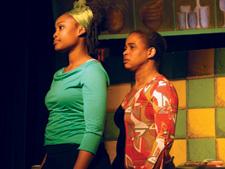After an overwhelming response from the queer Caribbean community to her satirical dub-styled response to reggae lyrics that advocate the execution-style killing of gay men, entitled The Chi-Chi Person’s Revolution, playwright Deirdre Walton realized that queer stories within Jamaican culture could provide a powerful theatrical experience for anyone, in her words, “caught in the space between the culture they left behind and the one they have joined.”
Walton’s recent workshop production of the first act of her play Inna di Wardrobe reveals her dramaturgical hunch to be both rich and rewarding as the piece promises to become an extremely entertaining seriocomic treatment of a universal message regarding family, loyalty and same-sex love.
Blessed by a stellar cast, the playwright’s use of flashbacks organized around a traditional family dinner named Big Food Day provides the ensemble with ample opportunity to display their diverse skills as comic and dramatic actors. Yvette Martin as the disgruntled mother is able to represent rage and comic physical agility with an amazing ease. David Smith’s kindly old grandfather is a fine study in sensitivity and impeccable comic timing. Camille Lesley-Ann Walker as Femme and Meghan Swaby as Butch achieve a powerful sexual chemistry throughout the piece, as well as emotionally nuanced performances as they interact with levels of acceptance and hostility toward their fledgling lesbian love affair. Idil Mussa’s portrayal of Femme’s sister rounds out the cast with a truly wonderful performance that successfully straddles sexual curiosity, understanding and sisterly loyalty.
Director Rhoma Spencer has placed her actors within a beautifully painted, picture-book set by Silvia Temis and Monika Gerez, achieving sharp and effective cuts in and out of a series of various nonlinear scenes that tell the story through the events leading up to the family dinner. One scene between Butch and Femme, located in a video store and focusing on the film Kissing Jessica Stein, is a priceless bit of stock comic wordplay that could be developed a little further in future productions in order to pump up an already titillating and remarkable sexual dynamic between two determined, powerful young women.
The many stories that populate Inna di Wardrobe provide the playwright with so much potential for diverse characterization that one wonders how all of the material can fit into a single play, and yet Walton’s concise talent for addressing many issues simultaneously, without abandoning complex characterization promises to fare well in a completed version. One entertaining example concerns Claire, an unseen cousin who is about to embark upon her third marriage — to a white man — providing an indirect and compelling connection to the same-sex conundrum at the heart of the script. Walton’s text, as it embraces queer identity and individuals labelled everything from manroyal and pantyman, to zami, chichi man, sodomite, bullerman, macomeh man and fairy, begins to address the playwright’s quandary: “I stop to wonder how many more names one person can have because of their chosen sexuality.”

 Why you can trust Xtra
Why you can trust Xtra


